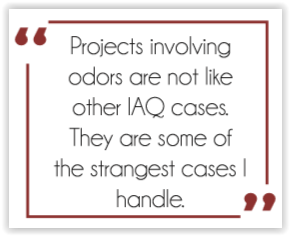Who Nose?
THE CHALLENGES OF IAQ AND ODORS
 I recognize that I am an authority on indoor air quality (IAQ) issues. After 30 years, I better be! At the same time, I admit I am not the expert in strange and unusual odors. However, this hasn’t stopped clients from requesting the services of my nose. Recently, in the span of just 10 days, I received calls to take on four separate odor-related projects. One case involved sewer-like odors, another involved mold-like odors, a third involved vomit-like odors, and the fourth was undermined because the client mysteriously canceled their appointments.
I recognize that I am an authority on indoor air quality (IAQ) issues. After 30 years, I better be! At the same time, I admit I am not the expert in strange and unusual odors. However, this hasn’t stopped clients from requesting the services of my nose. Recently, in the span of just 10 days, I received calls to take on four separate odor-related projects. One case involved sewer-like odors, another involved mold-like odors, a third involved vomit-like odors, and the fourth was undermined because the client mysteriously canceled their appointments.
I’m always happy when clients refer me, but chasing odors is my least favorite IAQ activity. Projects  involving odors are not like other IAQ cases. They are some of the strangest cases I handle. I’ve found sewage-like odors coming from new carpets, identified very offensive odors relating to cultural foods being reheated in the office microwave, and once, early in my career, I found a terrible odor coming from a certain type of coffee grounds interacting with the steam from an automatic coffee maker.
involving odors are not like other IAQ cases. They are some of the strangest cases I handle. I’ve found sewage-like odors coming from new carpets, identified very offensive odors relating to cultural foods being reheated in the office microwave, and once, early in my career, I found a terrible odor coming from a certain type of coffee grounds interacting with the steam from an automatic coffee maker.
The problem with odor projects isn’t the strange source or even the bad smell; it’s that 80 percent of the time when I arrive at the site, there’s no sign of the odor. Odors are often so sporadic they can be hard to track. If the cause is mold growing in insulated air conditioning vents, people might report the bad smell a couple times a day when the air kicks on. But if the odor is from someone heating up a certain kind of food, that might happen only once a week. If there’s no odor when I arrive, the best I can do is walk the area, find out where people have been complaining and where there haven’t been any complaints, try to get people to tell me about what they’ve been smelling, and look for common problems.
The fact that I can’t come in with an instrument to collect data on an odor project is extremely frustrating. There are no instruments available that can track an odor because there are too many possibilities that could cause a bad smell. Plus, the human nose is far more sensitive than any instrument out there. You and I will notice the presence of an odor long before any instrument would pick it up.
After 30 years and many cases, I have enough experience to guess with some accuracy what might be causing the issue if I can’t smell the odor myself. But even once I’ve found the source, there’s no way to know for sure unless the odor never happens again. Of the three cases I mentioned earlier, I was able to confidently identify the source of two of them. In the third, the property manager thinks they solved the problem, but now it’s the waiting game.
Let’s be honest, I have considered telling everyone my nose is shot and I can’t do odors anymore. Sometimes it feels like I’m chasing ghosts. I went to a site four times within a week and a half, never smelling the odor myself but giving the property manager advice on what it might be. They thought they found it when I called 10 days later and there hadn’t been anymore complaints. Then two days later, the odor showed up again for 15 minutes.
Any IAQ consultant worth their weight should have experience chasing odors, but don’t expect them to come in with a magic want to identify and resolve your issue in one fell swoop. It can’t be done because odors are so sporadic. When you have an odor problem, you literally have to follow your nose.

